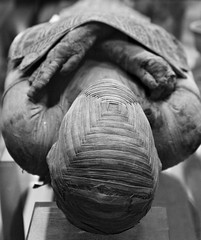The businessman was John Rowe, Chairman of Exelon (big power, big money), and he’s particularly proud of a 2,600 year old Egyptian sarcophagus that he keeps in his office -- in a glass display case.
Hawass reacted the way you might if he invited you into his living room where you found your Aunt Nell lying in state under glass.
Well, okay, it wasn’t quite like that. Here’s Hawass’s soundbite as reported in the New York Times:
Ancient artifacts are not for display in homes and offices; rather they are meant to be shown in museums and institutions.I’m still trying to puzzle out Hawass’s stance. Does he equate the museum with a sacred space, like a cathedral, and the sarcophagus with a relic on display? Or is he down with the fundamentally democratic nature of the museum, and its access to all comers?
I’m guessing maybe the latter, because he goes on to say:
King Tut himself would not be pleased to see a priceless Egyptian artifact trapped inside the office of any one individual.This is funny for a couple of different reasons: 1) that Hawass feels so confident in his ability to channel the desires of the boy king and 2) that a KING would be all about ACCESS FOR ALL.
Tut-tut.
Hawass, who the NYT’s says “is also known for his ability to stir controversy at an opportune moment” demanded that the Field Museum drop Exelon as a sponsor of the King Tut exhibit immediately unless Rowe either returned the sarcophagus to Egypt or gave it to the Field.
Rowe complied by offering it to the local museum on indefinite loan.
[photo credit: Torbein@Flickr]







2 comments:
Interesting article. I would think that King Tut would be more concerned that he and his peeps have been on display anywhere! I'm sure that was not the original plan!!
I would have to agree, anali. ;)
Post a Comment